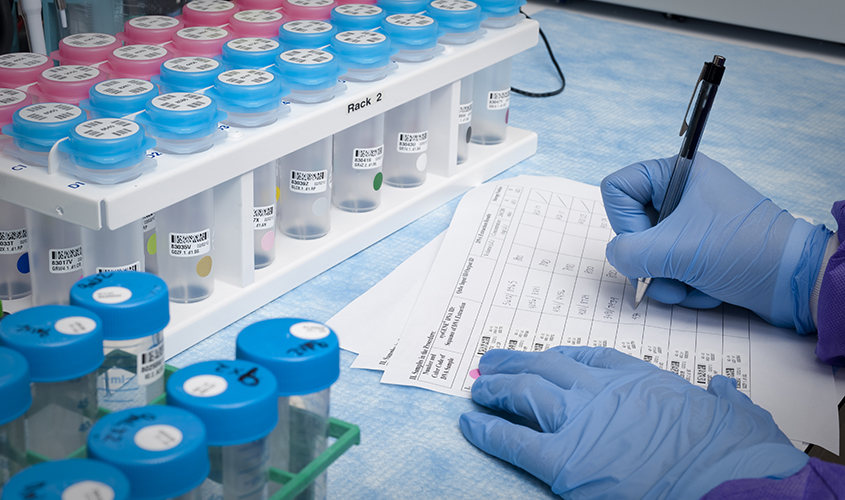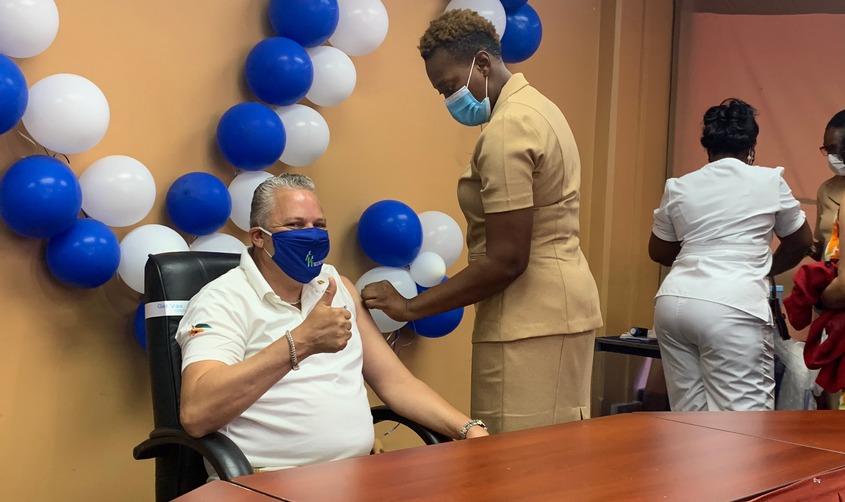
With the development of a state-of-the-art diagnostic molecular facility on campus, St. George’s University has assured its community and the country of Grenada that SGU will be prepared to do its part should another infectious disease outbreak surface in the near or distant future.
The laboratory is housed in the on-campus Windward Islands Research and Education Foundation (WINDREF) building, and was constructed to meet World Health Organization (WHO) standards.
“By upgrading our laboratory, we can now provide a long-term diagnostic molecular facility that could provide timely and appropriate diagnostic services for the University and potentially the region,” said Dr. Calum Macpherson, director of research at SGU. Previously, most diagnostic testing had to be sent outside of Grenada for analysis, often creating longer lead times for receiving results.
In addition to diagnostics, the lab will serve as a teaching facility for graduate and undergraduate students interested in molecular technology elective courses. It will also be a resource for faculty and students to conduct research on emerging and re-emerging vector-borne diseases and other infections.
By demonstrating the capacity to accurately and safely test hundreds of cases each week, Dr. Macpherson envisions that the lab will further enhance international and regional partnerships with such groups as the Pan American Health Organization (PAHO), Caribbean Public Health Agency (CARPHA), and universities worldwide.
[av_testimonial_single src=’78982′ name=’Dr. Calum Macpherson’ subtitle=” link=’http://’ linktext=” av_uid=’av-w4wg7v’]
“We can now provide a long-term diagnostic molecular facility that could provide timely and appropriate diagnostic services for the University and potentially the region.”
[/av_testimonial_single]
[/av_testimonials]
Commitment to accuracy and efficiency
SGU’s molecular lab will be overseen by Elsa Chitan, the head of the WINDREF laboratories, and will be initially utilized to conduct all COVID-19 testing on campus. Vanessa Matthew-Belmar, MSc ’16, a lab technician in the School of Veterinary Medicine, will use the lab to conduct her PhD studies on COVID-19 at SGU.
“The molecular lab will provide a diverse group of students and faculty with a molecular facility, which is increasingly the Gold Standard for diagnosing infectious diseases,” said Dr. Trevor Noël, director of SGU’s field research studies in the Office of Research and deputy director of WINDREF. Since its founding in 1994 as a non-governmental organization in Grenada and as a 501(c)(3) non-profit charitable foundation, WINDREF has been committed to health and environmental development through research and education programs, by promoting collaborative relationships between internationally recognized scholars and regional scientists, and by adhering to the highest ethical research and academic standards. WINDREF’s current donors include the NIH, Grand Challenges Canada, Nature Conservancy International, FAO, The Spencer Foundation, Global Challenges Research Fund, United Nations Framework Convention on Climate Change, the Global Water Partnership, and many other entities.
SGU’s molecular lab in the School of Veterinary Medicine served as Grenada’s initial national SARS-CoV-2 testing site at the onset of the pandemic last year. It was one of approximately 250 quality control labs around the world overseen by the WHO. Its results were in 100 percent concordance with the expected test results from the WHO. The national testing laboratory located at the Grenada General Hospital continues to collaborate with WINDREF personnel on best diagnostic practices.
PCR testing continues at SGU’s Open Modica Hall, where Dr. Kathy Yearwood, director of University Clinical Services and Dr. Jennifer Solomon, chair of nursing and allied health science, join staff from the University Clinic, nursing program, and WINDREF COVID-19 team, have been testing the SGU affiliated community and contractors. The program has tested almost 8,000 individuals over the past year with the majority of the results returned to those tested within eight hours. A rapid turnaround is essential for the test to be useful for epidemiological surveillance, and its success played a significant role in limiting the numbers of COVID-19 infections in Grenada over the past year.

SGU faculty step forward in Grenada vaccine rollout
Drs. Macpherson and Noël were amongst the first to receive the COVID-19 vaccine developed by Oxford/AstraZeneca SARS-CoV-2 vaccine on February 12. They joined the Grenada Prime Minister, Dr. the Right Hon. Keith Mitchell; Minister of Health the Hon. Nickolas Steele; and a number of cabinet members, senior administrators from the Ministry of Health, and some frontline workers.
“In Grenada, non-pharmaceutical measures have been in place from the beginning, whether it’s a limited curfew, the mandatory wearing of masks in public, frequent washing of hands, physical distancing, along with a rapid test, trace, and isolate and quarantine program, all helped to maintain the low numbers of COVID-19 infections in Grenada,” Dr. Macpherson said. “As a result, we have had so few cases, which means that almost everyone is immunologically naïve and susceptible to infection. The vaccine is the final piece to protect everyone in Grenada.”
[av_button label=’Related news: Under the Microscope – COVID-19 Vaccines in Grenada’ icon_select=’no’ icon=’ue800′ font=’entypo-fontello’ link=’manually,https://www.sgu.edu/news-and-events/under-the-microscope-covid-19-vaccinations-in-grenada/’ link_target=” size=’large’ position=’center’ label_display=” title_attr=” color_options=’color_options_advanced’ color=’theme-color’ custom_bg=’#444444′ custom_font=’#ffffff’ btn_color_bg=’custom’ btn_custom_bg=’#00bec8′ btn_color_bg_hover=’custom’ btn_custom_bg_hover=’#0e0d44′ btn_color_font=’custom’ btn_custom_font=’#ffffff’ id=” custom_class=” av_uid=’av-regtbz’ admin_preview_bg=”]
Both Dr. Macpherson and Dr. Noël reported having only transitory mild side effects from the first of two vaccine shots. The immediate rollout of the vaccine will be administered by the Community and Public Health nurses of the Ministry of Health at the Grenada General Hospital. Dr. Yearwood and members of the SGU clinical team and WINDREF COVID-19 team were among those to receive the vaccine early in its rollout.
“The strong partnership between the Ministry of Health, SGU, WINDREF, PAHO/WHO and the participation of the people of Grenada with the non-pharmaceutical measures allowed Grenada to limit the number of cases of COVID-19 in Grenada to extremely low levels,” said Dr. Macpherson. “It has been a pleasure for us to be a part of this remarkable public health achievement.”
– Brett Mauser
